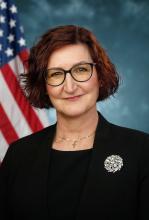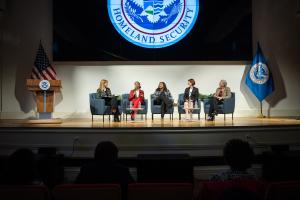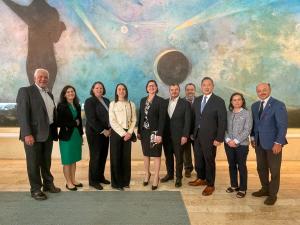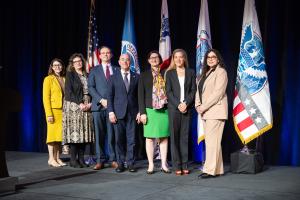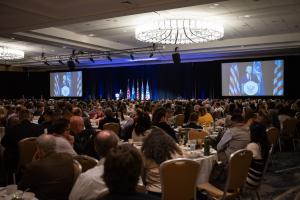-
This March, I had the opportunity to connect with a range of trade partners from around the globe between my travels in Mexico and the Trade Facilitation and Cargo Security Summit in Philadelphia. One topic I found myself returning to during conversations with industry leaders and government officials alike was how we can work together to integrate innovation with ethical trade practices. These discussions underscored the critical role of our diverse, global, and domestic trade partnerships in fostering a secure, fair, and forward-thinking trading landscape, as well as the possibilities for further collaboration. I look forward to exploring these opportunities in the coming months.
I was also glad to celebrate Women’s History Month with colleagues throughout the U.S. Government and the international trade community at several events. Together, we reflected on the vital contributions of women in shaping the customs and trade landscape and reaffirmed our commitment to gender equity as a cornerstone of ethical and forward-thinking trade practices. We all agreed: our organizations are at their strongest when they are diverse and equitable, and that is something we will continue to work toward.
~ Executive Assistant Commissioner AnnMarie R. Highsmith
Contents
- EAC's Message
- I. Office of Trade Activity
- EAC Highsmith talks trade in Mexico City
- CBP convenes Trade Facilitation and Cargo Security Summit
- CBP partners with FDA on Global Business Identifier Test
- Ford Motor Company resolves customs violations in historic $365 million settlement
- EAC Highsmith champions female leadership during Women’s History Month celebrations
- II. Outreach
- III. News You Can Use
- Article 1: CBP intercepts counterfeit championship rings worth $2.71 million
- Article 2: CBP K9 sniffs out the illegal import of mummified monkey remains
- Article 3: Importer and firm plead guilty to conspiracy to avoid paying over $1 million in Antidumping and Countervailing Duties
- Article 4: CBP inaugurates a modernized San Juan Custom House
- Article 5: CBP seizes 280 unsafe toddler travel beds and baby playpens
- Article 6: CBP officers seize over $8.4 million in methamphetamine at World Trade Bridge
- Article 7: CBP officers thwart smuggler’s attempt to smuggle toucan and parrots at Tecate Port of Entry
- Article 8: Commercial Customs Advisory Committee holds first public meeting of 2024
- Article 9: CBP seizes counterfeit watches worth over $11 million
- Article 10: CBP officers, agriculture specialists intercept howler monkeys at Brownsville and Matamoros International Bridge
- Trade Statistics
I. Office of Trade Activity
EAC Highsmith champions female leadership during Women’s History Month celebrations
Throughout March, Executive Assistant Commissioner (EAC) AnnMarie R. Highsmith addressed audiences at several events hosted by CBP, the U.S. Department of Homeland Security, and the international customs community in celebration of Women’s History Month. During these engagements, she shared her experiences and growth as a female leader, providing a unique perspective on overcoming challenges and contributing to global conversations on increasing diversity and empowering women in customs. You can listen to what she had to say by watching this panel discussion on the topic of “Women Advocating for Equity, Diversity, and Inclusion,” moderated by the Senior Official Performing the Duties of the Deputy Secretary of the Department of Homeland Security, Kristie Canegallo.
EAC Highsmith talks trade in Mexico City
From February 28 to March 5, U.S. Customs and Border Protection (CBP) EAC Highsmith traveled to Mexico City, Mexico for meetings with Mexican customs officials, the Mexican Tax Administration, and the Mexican Department of Labor, as well as for roundtable discussions with the American Chamber of Commerce in Mexico, the Mexican Business Council for Foreign Trade, Investment and Technology, and other Mexican trade associations. EAC Highsmith also addressed an audience of Mexican students interested in becoming trade professionals at the Benjamin Franklin Library, where she spoke about the current challenges of global trade, CBP’s efforts to manage the rapid rise in e-commerce, and strategies to combat forced labor and supply chain disruption caused by climate change. The visit was an opportunity to advance cooperation between the United States and stakeholders in Mexico on issues such as forced labor enforcement and green trade, as well as to raise industry awareness of the implications of the 21st Century Customs Framework, ACE 2.0, and other CBP customs modernization efforts for cross-border trade.
CBP convenes Trade Facilitation and Cargo Security Summit
From March 26-28, CBP hosted the Trade Facilitation and Cargo Security Summit in Philadelphia, Pennsylvania, bringing together industry professionals, partner agencies and other stakeholders to discuss the latest trade developments and best practices. EAC Highsmith and other senior leaders and experts from the Office of Trade delivered remarks and led workshops for the 1,200 individuals in attendance in Philadelphia as well as the 3,000 people tuning in virtually.
On the first day of the Summit, EAC Highsmith participated in a CBP Leadership Town Hall where she stressed the importance of collaboration with the trade community and federal partners in ensuring supply chain resiliency, described customs modernization efforts, and the implementation of the CBP Green Trade Strategy.
EAC Highsmith also interviewed William A. Reinsch, Scholl Chair in International Business at the Center for Strategic and International Studies, and co-host of The Trade Guys podcast. The two spoke about a number of major trade issues including forced labor, supply chain diversification, international trade agreements, the de minimis provision, and pending congressional measures regarding trade enforcement and facilitation.
Deputy EAC John P. Leonard moderated a panel of “Tackling Forced Labor in Global Trade and U.S. Supply Chains” featuring Executive Director of Trade Remedy Law Enforcement Eric Choy. Other panel discussions over the course of the Summit addressed CBP’s counter-fentanyl efforts, green trade, supply chain security, e-commerce, broker continuing education, and customs modernization initiatives such as the Global Business Identifier (GBI) test.
CBP partners with FDA on Global Business Identifier Test
During the Trade Facilitation and Cargo Security Summit, CBP announced plans to expand the focus of the GBI test in partnership with the Food and Drug Administration. Under the expanded test, the agencies will work together to explore how identifiers − unique numbers that capture information about legal business entities and their functions – can help enhance coordination across the U.S. Government. The test could help the agencies identify high-risk shipments earlier and facilitate legitimate shipments, all while promoting greater supply chain traceability. Read the Expanded GBI Test press release and refer to CBP’s GBI Test webpage for more.
Ford Motor Company resolves customs violations in historic $365 million settlement
On March 11, Ford Motor Company reached a landmark settlement to resolve civil penalty claims from CBP. The settlement stems from allegations that Ford Motor Company misclassified more than 150,000 Transit Connect cargo vehicles under the Tariff Act of 1930 and also understated the vehicles’ value to avoid paying higher duties. The settlement agreement − one of the largest customs penalty settlements in recent history – requires Ford Motor Company to pay $365 million to the United States.
This collaborative enforcement effort involved multiple offices across CBP and the Department of Justice, underlining the U.S. Government’s commitment to upholding trade regulations and maintaining a level playing field for all. Read the full U.S. Department of Justice press release to learn more about CBP’s pivotal role in this case.
II. Outreach
CBP launches innovative dashboards for trade violations and enforcement
On March 11, CBP unveiled two innovative dashboards focusing on the Enforce and Protect Act and e-Allegations programs as part of its ongoing efforts to enhance transparency in trade enforcement. These dynamic tools provide the public and the trade community with valuable insights into trade violation allegations, empowering stakeholders with key data to support fair trade practices.
Members of the public and trade community can use the new dashboards to explore updated data and global trends on the trade violation allegations that CBP receives, including information on the possible countries of origin, volume, and types of trade violation allegations processed through the Trade Violations Reporting Tool. The two dashboards are available to the public on CBP.gov at:
Read the press release to learn more about how these dashboards provide enhanced visibility into trade violations.
CBP leads delegation to World Customs Organization
From March 4-15, CBP’s Office of Trade led the U.S. Delegation to the 73rd Session of the Harmonized System Committee of the World Customs Organization in Brussels, Belgium. Topics covered tariff classification matters pertaining to a range of areas of interest, from merchandise related to “green trade,” food products, and products related to the automotive and technology industries. The meeting provided an opportunity to ensure that globally traded merchandise is classified in a predictable and consistent manner.
III. News You Can Use
-
CBP intercepts counterfeit championship rings worth $2.71 million
-
CBP K9 sniffs out the illegal import of mummified monkey remains
-
Importer and firm plead guilty to conspiracy to avoid paying over $1 million in Antidumping and Countervailing Duties
-
CBP inaugurates a modernized San Juan Custom House
-
CBP seizes 280 unsafe toddler travel beds and baby playpens
-
CBP officers seize over $8.4 million in methamphetamine at World Trade Bridge
-
CBP officers thwart smuggler’s attempt to smuggle toucan and parrots at Tecate Port of Entry
-
Commercial Customs Advisory Committee holds first public meeting of 2024
-
CBP seizes counterfeit watches worth over $11 million
-
CBP officers, agriculture specialists intercept howler monkeys at Brownsville and Matamoros International Bridge
Trade Statistics
Monthly Trade Statistics
In February 2024, CBP processed more than 2.6 million entry summaries valued at more than $255 billion, identifying estimated duties of nearly $6.5 billion to be collected by the U.S. government. Trade via the ocean environment accounted for more than 40 percent of the total import value, followed by air, truck, and rail. CBP stopped 540 shipments valued at more than $306 million for further examination based on the suspected use of forced labor, and which may be subject to a Withhold Release Order, Forced Labor Finding, or the Uyghur Forced Labor Prevention Act’s rebuttable presumption prohibiting importation into the United States. In February, CBP seized 1,645 shipments that contained counterfeit goods valued at more than $345 million.



